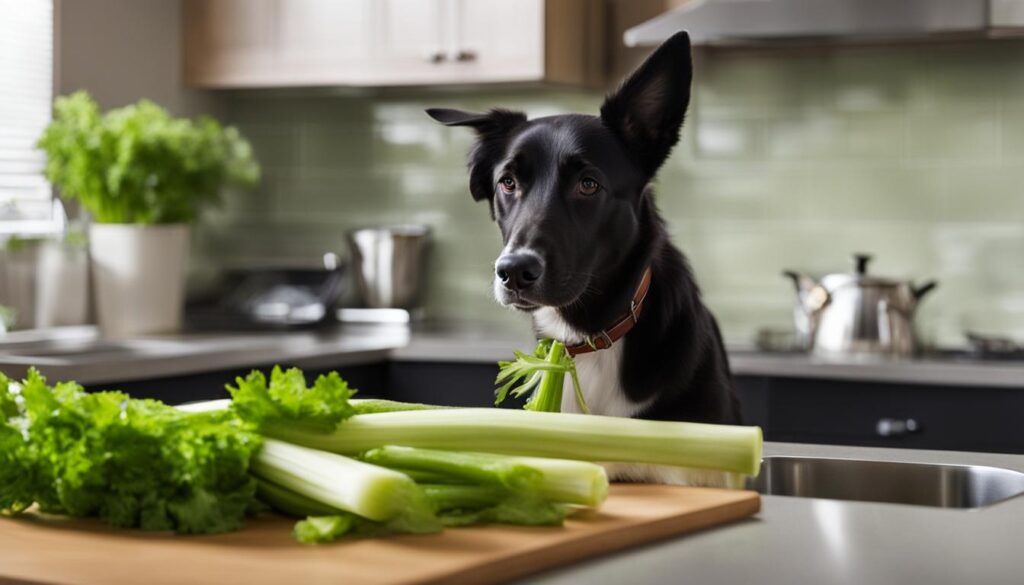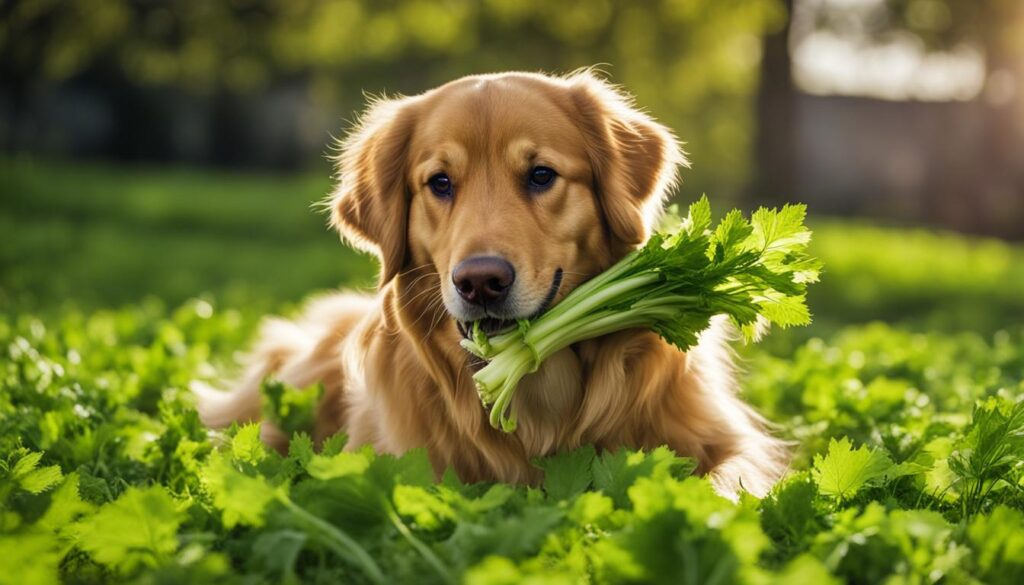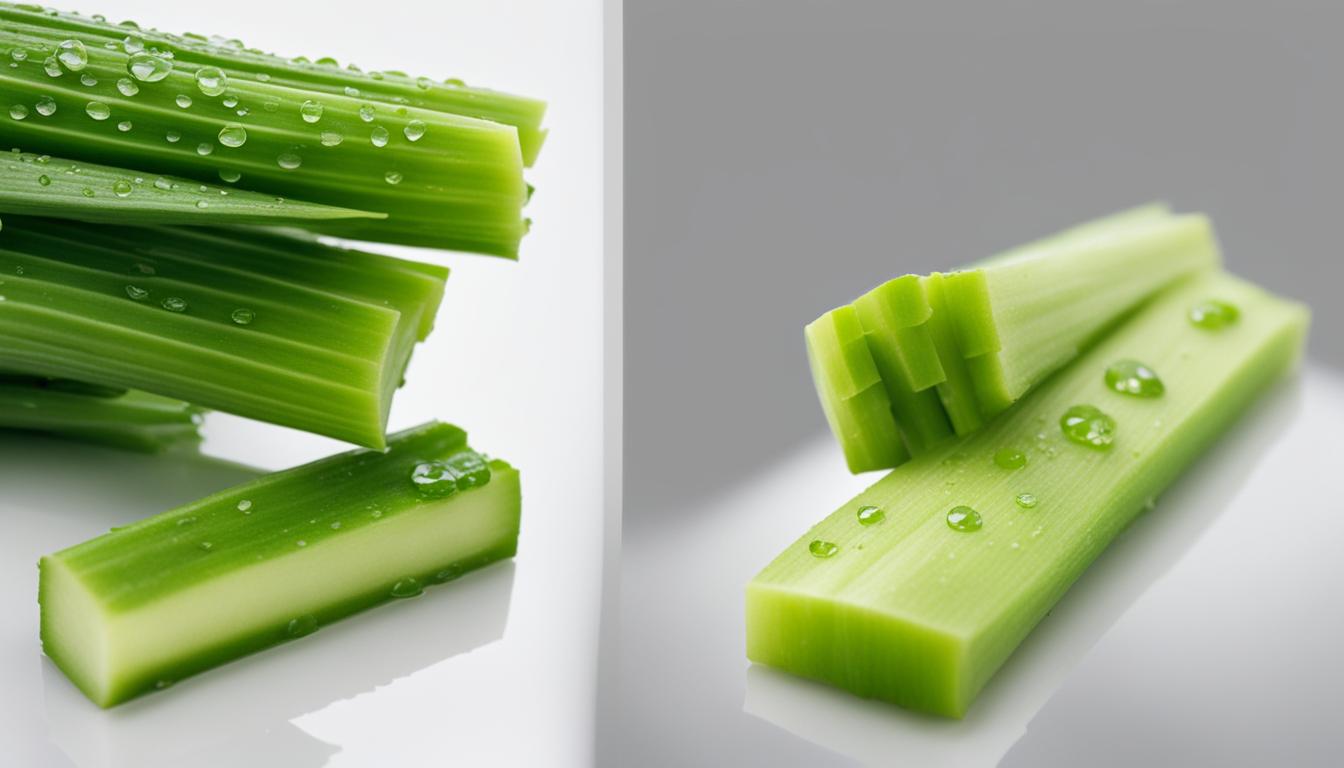Dogs are known for their love of treats, and as a pet owner, you may find yourself wondering if it’s safe to share your snack with your furry friend. One food that often comes to mind is celery. So, can dogs eat celery? Let’s dig into the details and evaluate the nutritional value of celery for dogs.
Key Takeaways:
- Celery is a safe and healthy snack for dogs in moderation.
- It is packed with vitamins and minerals that support various bodily functions in dogs.
- Celery is low in calories, making it suitable for overweight dogs or those on a diet.
- The high water content of celery promotes hydration in dogs.
- The fibrous texture of celery can improve oral health and digestion in dogs.
Is Celery Safe for Dogs?
When it comes to feeding celery to your canine companion, the answer is yes – celery is generally considered safe for dogs to eat. However, it’s crucial to feed celery in moderation and take certain precautions to ensure your dog’s safety and well-being.
While celery itself is not toxic to dogs, there are a few risks to be aware of. Overeating celery can lead to gastrointestinal issues such as upset stomach, gas, bloating, vomiting, and diarrhea due to its high water and fiber content. Additionally, celery can be a choking hazard, especially for small dogs, so it’s important to chop it into small, bite-sized pieces before offering it to your furry friend.
Furthermore, it’s worth noting that some dogs may be allergic to celery. Therefore, it’s essential to observe any signs of allergic reactions such as itching, redness, swelling, or difficulty breathing. If you notice any of these symptoms, it’s best to consult a veterinarian for further guidance.
Table: Pros and Cons of Feeding Celery to Dogs
| Pros | Cons |
|---|---|
| Rich in essential vitamins and minerals | Potential gastrointestinal issues if overeaten |
| Low in calories, fat, and cholesterol | Possible choking hazard, especially for small dogs |
| Promotes hydration due to high water content | Some dogs may be allergic |
| Fibrous texture can improve oral health and digestion |
Remember, each dog is unique, and what works well for one may not work for another. It’s important to introduce new foods gradually and monitor your dog’s response. If you have any concerns or doubts about feeding celery to your dog, it’s always a good idea to consult with your veterinarian for personalized advice.

Benefits of Celery in a Dog’s Diet
When it comes to incorporating celery into your dog’s diet, the benefits are aplenty. This crunchy and hydrating vegetable offers a range of vitamins and minerals that support various bodily functions in dogs. For instance, celery is rich in vitamin A, which is essential for healthy vision. It also contains vitamin C, which boosts the immune system, and potassium, which helps regulate blood pressure and maintain proper heart function.
Another advantage of celery is its low calorie content, making it an excellent choice for dogs who need to shed a few pounds or maintain a healthy weight. The high water content of celery not only promotes hydration but also aids in digestion. The fibrous texture of celery can help improve your dog’s oral health by reducing plaque buildup and stimulating saliva production, which helps combat bad breath.
Furthermore, the antioxidants found in celery can have anti-inflammatory properties, potentially benefiting dogs with chronic conditions such as arthritis. These antioxidants also enhance immune health and support overall well-being in dogs.
| Nutrient | Amount per 100g of Celery |
|---|---|
| Vitamin A | 449 IU |
| Vitamin C | 3.1 mg |
| Potassium | 260 mg |
| Folate | 36 µg |
| Manganese | 0.1 mg |
While celery can provide these benefits to dogs, it’s important to remember that moderation is key. Too much celery can lead to gastrointestinal issues, so be sure to offer it as an occasional treat rather than a main component of your dog’s diet. As always, it’s best to consult with your veterinarian before introducing any new food into your dog’s routine.
How to Safely Feed Your Dog Celery
When it comes to feeding your dog celery, there are a few important things to keep in mind to ensure their safety. Follow these tips to make sure your furry friend can enjoy this crunchy veggie without any issues:
1. Wash thoroughly:
Before giving celery to your dog, it’s essential to wash it thoroughly to remove any dirt or bacteria that may be present on the surface. This will help prevent any potential digestive problems or illnesses.
2. Cut into small pieces:
Celery can be a choking hazard, especially for small dogs or those who tend to gulp food quickly. To avoid any accidents, it’s best to cut the celery into small, bite-sized pieces before offering it to your dog. This will make it easier for them to chew and digest.
3. Start with a small amount:
Introduce celery to your dog’s diet gradually and start with a small amount. This will allow you to observe their reaction and ensure that they tolerate it well. If your dog shows any signs of stomach upset or allergic reactions, such as vomiting or itching, discontinue feeding celery and consult with your veterinarian.
4. Avoid seasonings and additives:
Celery is best served plain and without any seasonings or additives. Dogs don’t need the added salt, spices, or dressings that humans may use on celery. These can be harmful to dogs and may cause digestive issues or even toxicity. Stick to feeding plain, fresh celery to your furry friend.
By following these guidelines, you can safely incorporate celery into your dog’s diet as a healthy and enjoyable treat. Remember to always prioritize your dog’s well-being and consult with a veterinarian if you have any concerns or questions about feeding celery to your dog.

Other Healthy Vegetables for Dogs
In addition to celery, there are several other vegetables that can be healthy snacks for dogs. Incorporating a variety of vegetables into your dog’s diet can provide them with additional nutrients and health benefits. Here are some examples of vegetables that are safe and beneficial for dogs:
- Carrots: Carrots are a great source of vitamins A and K, as well as fiber. They can help promote healthy vision and digestion in dogs.
- Bell Peppers: Bell peppers are rich in antioxidants and vitamins C and E, which can support immune health and reduce inflammation in dogs.
- Broccoli: Broccoli is packed with vitamins A, C, and K, as well as fiber and antioxidants. It can contribute to healthy digestion and even help fight cancer in dogs.
- Cabbage: Cabbage is a low-calorie vegetable that is rich in fiber and vitamins C and K. It can aid in digestion and may have anti-inflammatory properties for dogs.
- Green Beans: Green beans are a nutritious and low-calorie option for dogs. They provide vitamins A, C, and K, as well as fiber, and can support weight management and digestion.
- Peas: Peas are a good source of vitamins A, B, and K, as well as fiber and protein. They can help with digestion and provide energy for active dogs.
- Pumpkin: Pumpkin is a fiber-rich vegetable that can aid in digestion and regulate bowel movements in dogs. It also contains vitamins A and C.
- Spinach: Spinach is packed with vitamins A, C, and K, as well as iron and antioxidants. It can support immune health and contribute to overall well-being in dogs.
- Squash: Squash is a nutritious vegetable that contains vitamins A, C, and E, as well as fiber. It can promote healthy digestion and may have anti-inflammatory properties.
- Sweet Potatoes: Sweet potatoes are a good source of vitamins A and C, as well as fiber and antioxidants. They can support digestion and provide energy for dogs.
When introducing new vegetables to your dog’s diet, it’s important to do so gradually to avoid digestive upset. Always wash and properly prepare the vegetables, removing any seeds, peels, or stems that may be harmful to dogs. Remember to monitor your dog’s reaction to each new vegetable and consult your veterinarian if you have any concerns.
Offering a variety of vegetables can provide your dog with different nutrients and flavors, making their diet more balanced and enjoyable. Just like with any food, moderation is key, so be mindful of the portion sizes and adjust them according to your dog’s size, weight, and specific dietary needs. Vegetables can be a healthy addition to your dog’s snacks or meals, promoting overall wellness and supporting their long-term health.

The Benefits of Incorporating Vegetables into Your Dog’s Diet
Including vegetables in your dog’s diet can have numerous benefits for their health and well-being. Here are some of the key advantages:
“Vegetables provide essential vitamins and minerals that contribute to a strong immune system and support various bodily functions in dogs.”
– Dr. Sarah Thompson, DVM
| Benefits of Vegetables in a Dog’s Diet | Key Nutrients |
|---|---|
| Supports immune health | Vitamins A, C, and E, antioxidants |
| Promotes digestion | Fiber, vitamins A and K |
| Aids in weight management | Fiber, low calorie content |
| Improves oral health | Fiber, promotes saliva production |
| Reduces inflammation | Antioxidants, vitamins A and C |
By incorporating a variety of vegetables into your dog’s diet, you can provide them with essential vitamins, minerals, antioxidants, and fiber that promote overall health and well-being. Remember to consult with your veterinarian to determine the best vegetables and portion sizes for your dog based on their specific needs and dietary requirements.
Conclusion
After evaluating the nutritional value, safety, and benefits of celery for dogs, it can be concluded that dogs can indeed eat celery as a safe and healthy snack. Celery is packed with essential nutrients like vitamins A, C, and K, folate, potassium, and manganese, which support various bodily functions in dogs.
Not only is celery low in calories, making it a great option for weight management, but its high water content also promotes hydration in dogs. The fibrous texture of celery can help improve oral health by reducing plaque and stimulating saliva production, while also aiding digestion.
When feeding celery to your dog, it is important to chop it into small, bite-sized pieces to prevent choking hazards, especially for smaller dogs. Additionally, monitor your dog for any signs of stomach upset or allergic reactions. Remember to incorporate celery into your dog’s diet as a treat rather than a major component, and consult a veterinarian if you have any concerns or questions.
FAQ
Can dogs eat celery?
Yes, celery is safe for dogs to eat in moderation.
What are the benefits of celery in a dog’s diet?
Celery is packed with essential nutrients such as vitamins A, C, and K, folate, potassium, and manganese, which support vision, bone growth, immune response, and various metabolic functions in dogs. It is also low in calories, making it a great option for weight management. The high water content promotes hydration, and the fibrous texture can improve oral health and digestion.
Is celery safe for puppies?
Yes, celery is safe for puppies to eat. However, it’s important to introduce it gradually and monitor their reaction to ensure they tolerate it well.
How should I feed celery to my dog?
When feeding celery to your dog, make sure to wash it thoroughly to remove dirt and bacteria. Cut celery into small, bite-sized pieces to prevent choking hazards, especially for small dogs. Start with a small amount to assess their reaction and avoid adding any seasonings or salt.
Are there other vegetables that are safe for dogs to eat?
Yes, there are several other vegetables that can be healthy snacks for dogs, such as carrots, bell peppers, broccoli, cabbage, green beans, peas, pumpkin, spinach, squash, and sweet potatoes. These vegetables provide a variety of vitamins, minerals, fiber, and antioxidants that are beneficial for dogs’ overall health.





